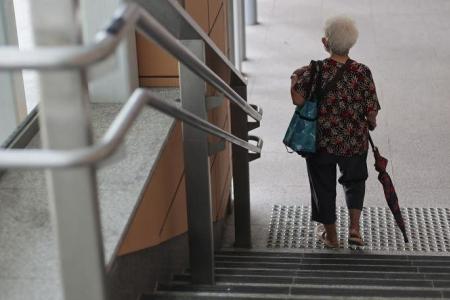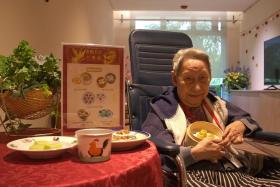Eldercare companions look after socio-emotional needs of KTPH patients with dementia, depression
Retirees Chee Tuck Hong, 63, and Foo Soon Leng, 70, have met difficult elderly patients of all kinds, from those who outrightly ignore their attempts to bond to those who become agitated and refuse to eat or walk.
But with patience, charm and keen observation skills, Mr Chee and Madam Foo have been able to build trust and connection with them, improving their willingness to cooperate with healthcare professionals for treatment and interventions.
The two retirees are among 12 part-time eldercare companions (ECCs) hired at Khoo Teck Puat Hospital (KTPH) to look after the socio-emotional needs of patients with dementia, delirium and depression. ECCs also plan activities for patients and help them out with daily activities such as walking and eating.
The programme began in January 2022 when the hospital realised that patients with diminished mental faculties need more time and attention for their emotional well-being, but healthcare staff did not have enough capacity to cater to their needs.
“Just by sitting next to the patient and listening to them or observing them, you realise why they have certain anxieties. I had a patient who refused to walk and eat, and later I realised it was because she was scared of being sent to a nursing home,” said Madam Foo, who has been working as an ECC since March 2022.
“I told her that if she didn’t want to be sent to a nursing home, she had to eat and walk, and she did.”
In Singapore, it is estimated that one in 10 seniors aged 60 and above has dementia. With increased life expectancy and a rapidly ageing population, the number of persons living with dementia in the Republic is expected to increase to 152,000 by 2030.
Explaining why volunteers and healthcare professionals are not able to fill that gap, KTPH’s advanced practice nurse Lee Su Hui said: “Patients who have cognitive impairment and are vulnerable may not be able to readily express their needs.
“Time is required to build a rapport with them. Volunteers might not be able to spend much time with them. We nurses do not have the luxury of time to spend an hour to really engage the patients.”
ECCs are paid an hourly rate for their work. Shift timings are from 9am to 1pm in the morning, and 2.30pm to 6.30pm in the afternoon, and they have to commit to at least two shifts a week.
While ECCs do not need to have a medical background, it is better if they are more mature in terms of age so they can better connect with patients. They should also have good people skills.
Every ECC undergoes five days of training with occupational therapists, speech therapists, and more experienced ECCs.
They pick up skills like handling a geriatric chair or hospital bed, choosing appropriate activities for the elderly patients, and identifying patients who have difficulty swallowing. The ECCs are also taught how to disengage if patients become aggressive, said Ms Lee.
Besides being a friend to the patients, ECCs are also the eyes and ears of doctors and nurses. One of their roles is to assess a patient’s emotional and physical well-being, picking up on things like what language they prefer to communicate in, their favourite food, hobbies, and what makes them happy or sad.
Such information can be used by the healthcare team to come up with suitable care interventions and plans that best cater to the patient.
Mr Chee, who started work as an ECC in May 2022, recalled a patient who refused to eat and who, when told to eat, would start clenching his fists.
But as the patient became more familiar with the ECCs, he became more responsive. “He started becoming more willing to eat when we offered him things that he liked, like coffee and kaya bread,” said Mr Chee.
ECC programme executive Daniel Seah said that some patients with dementia may wander around the wards, which can sometimes be disruptive.
“But when our ECCs offer to accompany them to walk around the wards and provide relevant emotional and psychological support, it ensures that the patients’ mobility continues to improve while also ensuring the risk of falling is kept to a minimum.
“I have seen how patients become less agitated and are more receptive to care from our doctors and nurses. This is a direct result of honouring the patient’s freedom of choice for independence.”
Ms Lee said that the hospital is still collecting data on the clinical outcomes of the ECC programme, but healthcare staff have already noticed a difference.
“They are more receptive to care. Instead of resisting, they are less agitated, restless, and they also feel happier,” said Ms Lee.
Get The New Paper on your phone with the free TNP app. Download from the Apple App Store or Google Play Store now


